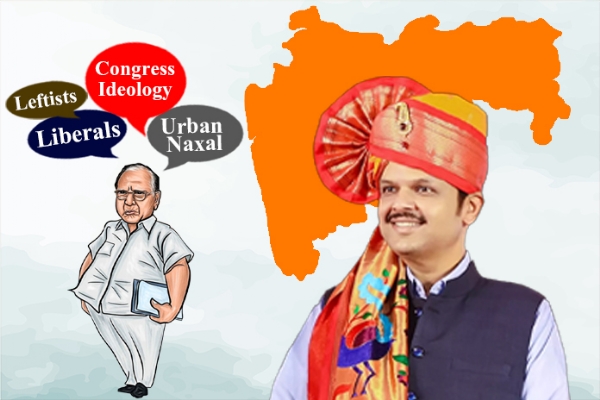Resurgence of Hindutva in Maharashtra: Leftists ideas replaced by Hindutva
05 Dec 2024 17:07:43
The installation of the Devendra Fadnavis-led BJP government in Maharashtra marks a significant ideological shift in the state. This change is not limited to politics but extends to the socio-religious landscape of Maharashtra. India has seen a series of positive, transformative changes, ever since Narendra Modi became Prime Minister in 2014. Maharashtra, too, has been a part of this change, though these shifts were not fully visible due to the entrenched dynamics and inbuilt compulsions of state politics. The 2024 Assembly election has confirmed that the BJP remains at the heart of Maharashtra politics, rather than the Congress ideology. In essence, Hindutva has replaced the so-called ‘progressive’ ideology that dominated Maharashtra’s politics since its formation in 1960.

Over the decades, various factions of Congress ideology, including Sharad Pawar, leftists, communists, and liberals, exploited the legacies of Shahu, Phule, and Ambedkar for political gains. They attempted to divide Hindus along caste lines for six decades, deliberately and mischievously misinterpreting history and creating division. Their efforts ensured that Maharashtra never experienced true social harmony, keeping the Marathi Manus perpetually in conflict with each other. Politicians like Sharad Pawar and his leftist comrades fuelled this sentiment, intellectually misleading at least three generations by this propaganda. As a result, Maharashtra, despite its immense potential, faced setbacks due to misguided and misplaced ideas.
More recently, Maharashtra has seen growing tension over Maratha reservation. Manoj Jarange, who led this agitation, continued his protests despite steps taken by the Shinde government. His agitation stirred deep caste divisions across the state, leading to unprecedented tensions. Non-Maratha and Maratha students even began avoiding each other at schools, refusing to sit together at meals. Is this a sign of a healthy and equal society? Meanwhile, opponents from the Hindu side kept the agitation alive, stoking caste sensitivities over time. BJP paid a heavy price for this in the Lok Sabha elections.
The outcome of the Maharashtra Assembly election should be viewed in this context. The Mahayuti, especially BJP, campaigned on the message of positive Hindutva. Thousands of activists reached out to voters, educating and awakening them. This outreach yielded rich fruits, leading to a ‘saffron tsunami’ in Maharashtra. BJP-led Mahayuti would not have won such a decisive mandate had people from all castes, languages, and regions not risen above caste barriers to support Hindutva’s larger appeal. Notably, Mahayuti secured the highest number of seats reserved for SCs and STs. Likewise, Hindu votes were also transferred to the Ajit Pawar-led NCP, ensuring that the anti-Hindu MVA could not regain power.
Several anti-Hindu leaders, such as Prithviraj Chavan, Balasaheb Thorat, Rajesh Tope, and Yashomati Thakur, lost in the election. Many MVA leaders were shocked by their defeat, unaware of the strong undercurrent of Hindutva. By undermining Hindutva and disrespecting Hindu sentiments, they faced the consequences. Sharad Pawar, once an overestimated leader, faced the most humiliating defeat. Uddhav Thackeray, who abandoned Hindutva, saw his party shrink to insignificance. The combined seats of Congress, Thackeray’s Shiv Sena faction, and the NCP-Sharad Pawar hit historic lows. The MVA’s defeat was so severe that none of its three parties secured enough seats to claim the Leader of the Opposition position. In short, Maharashtra decisively rejected the anti-Hindu Maha Vikas Aghadi.
For decades, the so-called progressive ideas dominated Maharashtra’s political landscape. These ideas have been challenged over the last 30 years, with real success seen in 2014. Bharatiya Janata Party securing three-digit victories in the Assembly elections for the third consecutive time contrasts sharply with the downward trajectory of anti-Hindu parties. The message is clear: BJP has claimed a central position in Maharashtra, and Hindutva has replaced the so-called progressive ideas once propagated by anti-Hindu parties under Congress’ banner. This shift is significant, as Maharashtra has long been considered a cradle for intellectual movements linked to the Left and Congress.
The outcome of the Maharashtra Assembly election is the manifestation of Hindu unity, with no room for discrimination. It is a victory for Hindutva, which is vigilant against anti-national forces, and signals the resurgence of a Hindutva vision focused on both materialistic and spiritual advancement. It is the triumph of Hindutva. It marks the return of an inclusive Hindutva, with Maharashtra shedding the ‘rust’ accumulated over decades. Today, we witness a bright and shining Hindutva.
